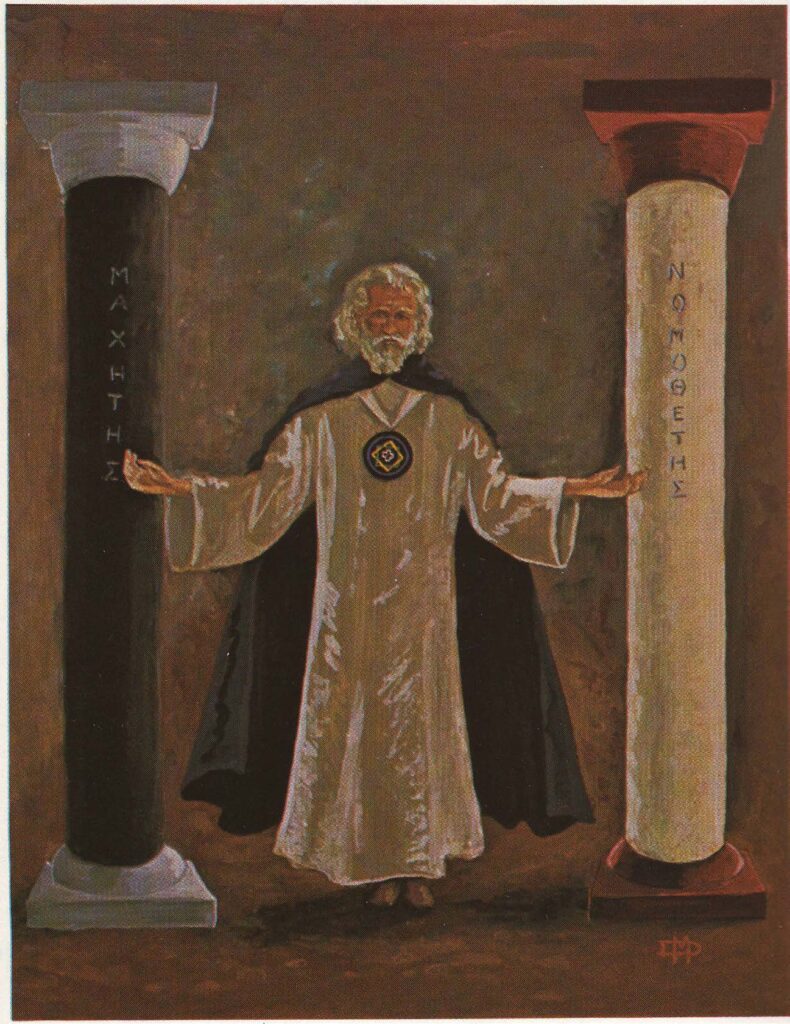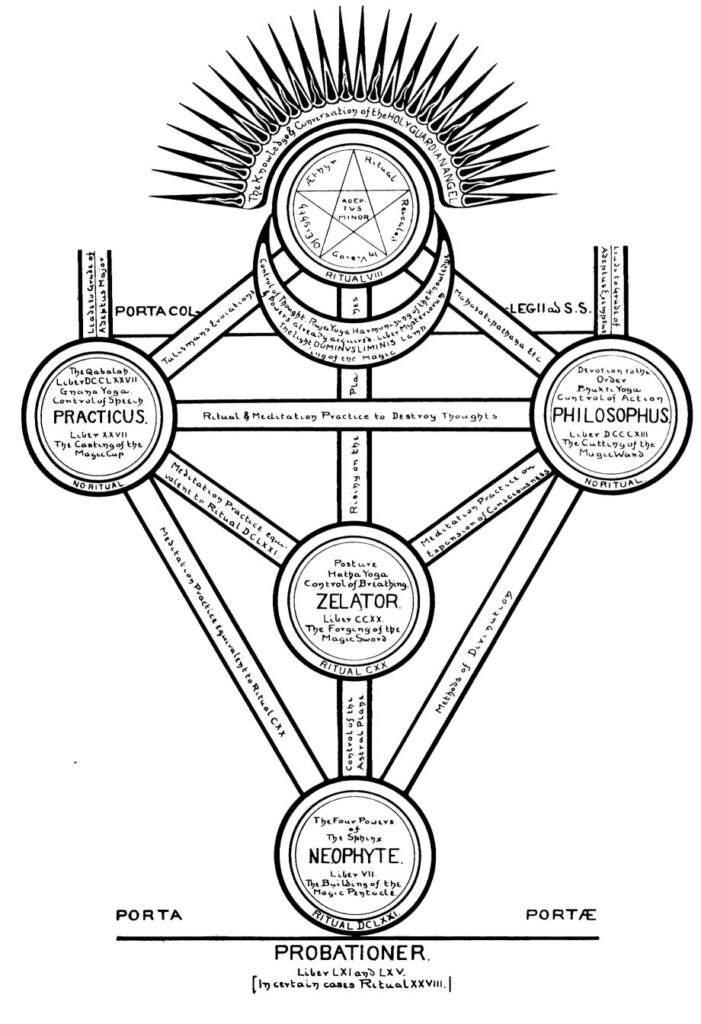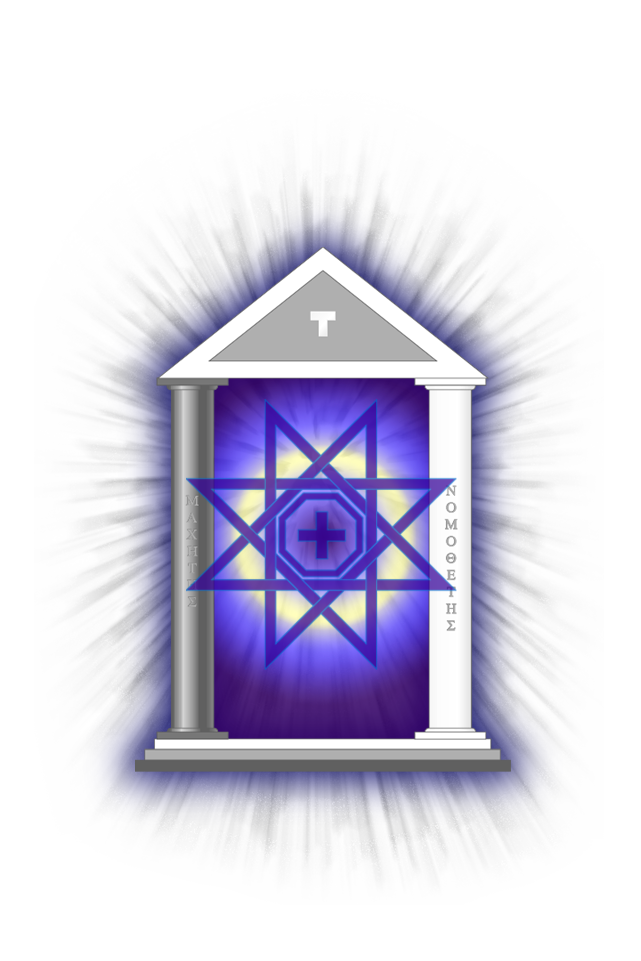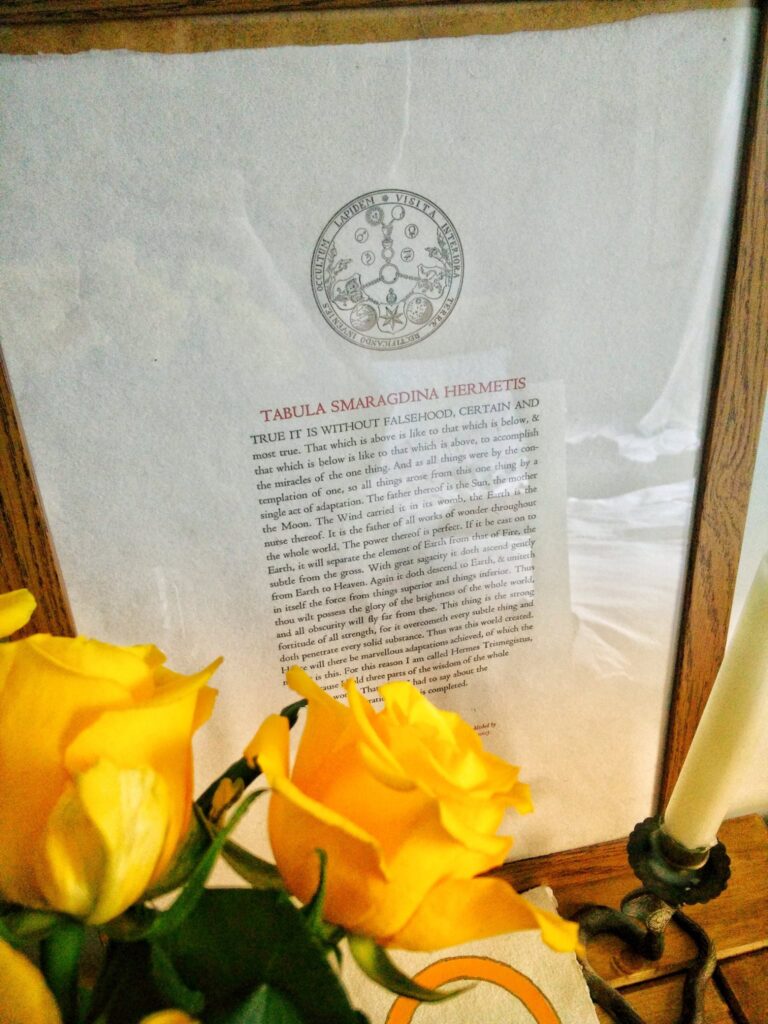
It is fashionable to claim we have evolved beyond the need for groups, lodges, covens or orders. The general low standard of popular occultism should easily disabuse us of that notion. Certainly you can become a skilled magician alone, working from good books and forging your own spiritual contacts. But such a magician will usually possess unusual gifts of determination, discipline and inner resource. Many (myself included) who spent years developing on their own also end up seeking out initiatory groups. Why?
Inside an esoteric order
First we need to be clear what we’re talking about. Broadly speaking, there are two types of order in the Western Mystery Tradition. One conveys mystical and ethical truths discursively, intellectually and emotionally through ritual plays: we can call these ‘Masonic’. The other is concerned with the use of ritual to invoke spiritual powers for the purpose of transformation; this latter form also involves the use of magical techniques, including visualisation, names of power, energy raising etc. We can call this latter form ‘magical’. To be clear, this boundary is extremely porous, and the two categories ideal. Ordo Astrum Sophiae falls into the second category.
Such orders have internal structures through which a candidate passes: these are external correlatives of an internal process of transformation. That is, each stage corresponds to certain internal spiritual developments and changes in the candidate.
So, for instance, in the Hermetic Order of the Golden Dawn, a candidate passes through a grade relating to each of the lower spheres of the Tree of Life in turn. Each of those grades has a curriculum, and each is inaugurated by a ritual awakening that sphere – an initiation. (In the early GD, the focus of these grades was discursive; in modern versions the curriculum is more magical.) The three Halls of the Astrum Sophiae correspond, among other things, to the three lower spheres of the Middle Pillar, with an appropriate magical curriculum for each. Our curriculum is geared to the eventual full realisation of the Holy Guardian Angel – after which, a new phase starts.

Magical orders are smaller than outsiders imagine. There are a number of reasons. The work is demanding, and the prospect of spiritual transformation daunting – even for those who think they want it. It requires a degree of trust and openness, as well as strong personal dedication. This atmosphere of mutual commitment and trust must be carefully guarded. (There are also some magical techniques which can be unpredictable and destructive without sufficient preparation.)
On top of this, in a healthy Order, experienced practitioners need to act in service to new initiates and maintain their own practice; there are concrete limits to time and energy here. The probationary periods imposed by most orders – a period in which a candidate demonstrates basic commitment – are a way of ensuring this limited resource isn’t wasted.
It follows that as well as the transmission of magical techniques, esoteric wisdom, and ritual experiment, the life of a magical Order also involves much administration, organisation and individual spiritual direction. A functioning group is constituted by human relationships, which must be carefully tended. There is rather more mundane fiddling with Google Calendar than Eyes Wide Shut-style gatherings.
Lastly, magical orders are ‘contacted’: discarnate spiritual powers are involved in the work, and the transmission of the tradition. There used to be a lot of stupid swivel-eyed rank-pulling about ‘real’ contacts, which makes everyone involved look ridiculous. Subjectively, the presence (or absence) of such powers can be felt by a sensitive candidate. Their manifestation can feel like being ‘pulled along’ to the tradition, or a run of strange synchronicities accompanying Order work. The importance of spiritual contacts is twofold: that there are powers in the tradition above and beyond the human beings who administer it, and that the spiritual force they transmit animates the tradition. Rather than fruitless arguments about the nature of these contacts, it is better to judge their worth by the kind of human beings produced by a given tradition or group.
Still, why initiation?

At this point we have to go beyond the anthropological definition of initiation, as a ceremony which marks the beginning of a new phase of life. The purpose of magical initiation is to bring about a new phase of consciousness and to accelerate spiritual development. In some traditions this can involve an introduction, or change in relationship, to certain spiritual beings.
Worked correctly, initiation ceremonies are very profound experiences. They involve a confluence of physical and subtle senses, light and scent and sound, beautiful and moving invocations, the unfolding of divine numen within the temple space. The initiator makes specific magical transmissions into the candidate’s subtle body, often while assuming a godform (i.e., making themselves a vehicle for that divine power). These alchemical transmissions may work on the candidate for months or even years after the ritual itself.
No candidate ever fully understands the experience during the rite itself. Even considered purely intellectually, there is simply too much to take in (and one’s mind is not really in thinking mode). Nor is the process complete at the rite’s end. The seeds that are planted are brought to full fruition by the new initiate’s work, study and meditation afterwards. The curriculum of a magical order is designed with this fruition in mind, in ways that are not always apparent on the surface.
Initiations also follow a pattern, often based on the qabalah. (Those of the Astrum Sophiae also correspond to the House of Sacrifice.) What is important is that these patterns form a holistic and balanced pathway of magical and spiritual development. The particulars of magical curricula vary widely, but typically they include the equilibration of the personality, and a gradually intensifying acquaintance with the elemental and planetary powers. (A powerful method of integration is the working of the semitae, the footpaths of the Tree of Life between Malkuth and Tiphareth: a perfect preparation for the Adept’s step.) Systematic awakening of these powers has profound beneficial effects in life beyond the temple, even prior to the high spiritual works for which they are the foundation.
In a magical Order, the candidate benefits from the catalytic effects of the initiation, as well as the attention and accumulated experience of those who have gone through the same process. The curriculum is structured to avoid lopsided development, or neglect of areas one might find challenging or difficult. It also develops a propulsive inner momentum when worked diligently.
Neglect of these ‘Outer Mysteries’ has nasty consequences down the line. Without it, all sorts of unexploded psychic ordnance risk blowing the magician’s head apart. ‘Magusitis’ arises from weak foundations, and the inflation of an untethered ego. The creepier sexual vices, the domineering and controlling behaviours which characterise toxic magical groups often attest to failure at this work by ‘leaders’. A clear-eyed survey of the many squalid pathologies of public occultism – parasitism, online excommunications and ‘wars’, indiscipline, inconstancy, shallowness, avarice, paranoid bitterness etc – suggests how rare serious integration of this work is.
Initiates should adopt the right pace. For the excessively confident, often intellectually precocious or well-read, that involves slowing down and learning to feel and internalise, learning that there are depths in the work which cannot be grasped by intellect alone. For the timid or self-doubting, it may involve developing the confidence to leap into the unknown and trust the work. (I was the former type.) The old motto festina lente, ‘hurry slowly’ is a good expression of the blend of intensity and patience required.
A functioning Order should produce:
- Competent magicians, who are capable of moving power, and who understand how and why their system works as it does;
- Who have attained within their own tradition, and become a living link in its chain;
- Who can therefore respond to the world around them, and whose spiritual practice is interwoven with their life;
- Who possess a broad knowledge and understanding of their own tradition, and the wider Western Mysteries;
- Who possess the inner equilibrium and balance which is the fruit of spiritual practice.
That is what the House of the Caduceus means when we say our aim is to ‘make adepts’.
In Praise of Orders

Much digital ink has been spilled on toxic magical groups, predatory orders and dangerous grifters. But they grab too much of the spotlight. Less is said in praise of healthy magical orders, and this leads to stupid misconceptions and false conclusions – that they are patriarchal, or authoritarian, or insubstantial.
The good Orders I’ve known, and have been privileged to be part of, have been led by committed people undertaking fairly extraordinary acts of service to a wider spiritual tradition. They work diligently to preserve, extend and transmit the Mysteries, and pass on the spiritual gifts they have received. Often they are unobtrusive and private, living fairly ordinary lives. They are rarely saints, though they often have an aura or presence about them. In an era which champions showy triviality, they defend depth and sincerity. Their lives are lived in perpetual reference to something greater than themselves.
I have come to learn, too, that the giving is not one way. Passing on a tradition, and conducting its rituals, deepens one’s own connection to it – often through the perceptive questions and new materials new initiates bring to their work. It is a profound honour, as well as a ‘high responsibility’ as Denning and Phillips point out, to observe its transformative effects.
Magical orders are not for everyone. They require commitment and the dedication of the whole person. They run against the grain of much contemporary culture: in fact, they are an antidote to its irreality and hollowness. They do not provide ‘content’ or easy commodities. They are a point of contact with something deep, vast and real. At their best, what they offer is beyond price: union with the divine. It remains my belief that many more seekers could benefit from their methods – if they dare to seek them out, and dare to commit.
Leave a Reply